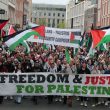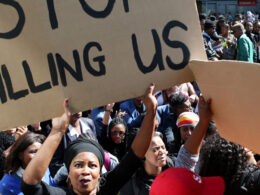By Summer Conneely
The student encampments that began in Columbia University have spread across the globe and caught the attention of many. The direct demands of these encampments are generally for the respective colleges to sever ties with Israeli institutions, Israeli companies, and companies or organisations complicit in the Israeli State’s genocide. More broadly, the camps represent a solidarity with the oppressed people of Palestine and a growing opposition to Western imperialism. These wider aspects of the movement are part of its incredible strength, going beyond the immediate goals of divestment to uplift the wider Palestine solidarity movement that has been at the forefront of the minds of many young and working-class people.
State repression to quell the revolt
The encampments began in Columbia University in New York City on 17 April. In response, the college set the police onto the protestors in a wave of mass arrests and brutality. A few days later, encampments began spreading across the US and later worldwide, including three to date in Ireland—Trinity College, UCD and UCC. A feature of these encampments has been incorporating and cooperating with various other movements, particularly those of anti-racism, indigenous rights, and others.
The reason, or necessity, for this broad movement, is seen through the number of far-right attacks on these encampments, such as those in UCLA. Uniting against our common enemy is a powerful tool for building movements against oppression, be it the far-right or the capitalist establishment parties—many of whom are or have backed this Israeli regime’s genocidal war to the hilt. This is why the latter are so keen on trying to divide us through cynically weaponised claims of antisemitism and calls for civility while at the same time sending the police to do their dirty work.
Criminalising protest
The police brutality that has been brought onto the encampments has been nothing short of horrifying. Thousands upon thousands of protestors have been arrested; many have been beaten and brutalised, all for protesting their ruling class’s involvement in genocide. In the case of UCLA, police only intervened after four hours of violent attacks by a zionist mob. Not simply limited to the US, the police of “enlightened” Europe have set upon protestors, too. From France to Germany to the Netherlands, where police used a bulldozer to demolish a camp in Amsterdam, protestors have been evacuated, beaten, and arrested, all the while tearing down the ever-fading myth of a liberal, tolerant Europe. These states are operating true to form—they have shamefully criminalised and vilified the Palestine solidarity protests since last October.
For many younger people, the genocide in Gaza is the worst atrocity in their lifetime and will almost certainly prove to be a defining event in world history. Rarely has an issue developed such a synchronous worldwide protest and solidarity movement on this scale, with young people currently on its sharpest edge in many countries—these solidarity encampments for further solidarity action. There is a real sense in society that there can be no business as usual as long as this genocide. The pressure is being felt by our capitalist rulers—this is the context in which the issuing of arrest warrants for Netanyahu and Galant by the International Criminal Court must be understood.
Trade union must act now
Most trade unions have thus far paid lip service to Palestine but done very little to mobilise their membership on the issue. Workers must independently organise now to take action and demand the full backing of the trade union movement. All companies that are profiting from this genocide and the occupation and oppression of Palestine must be targeted with strike action. A movement such as this that stands in solidarity with Palestine could be one avenue to help build a much wider struggle of workers, students, and all oppressed peoples, challenging the rule of capitalism and imperialism.












